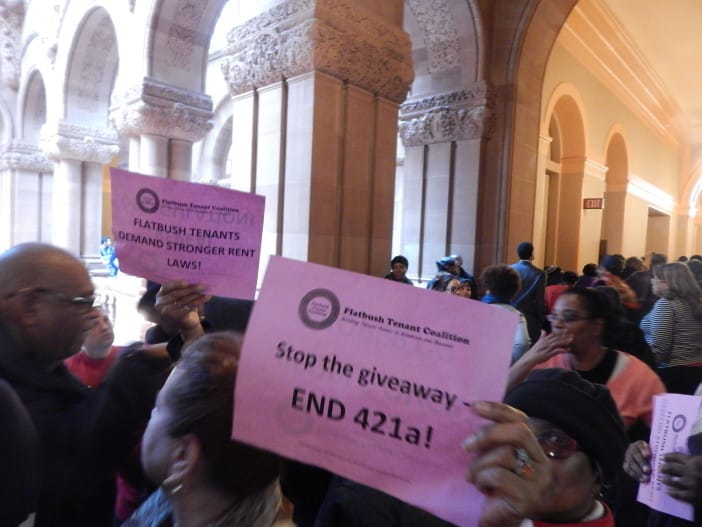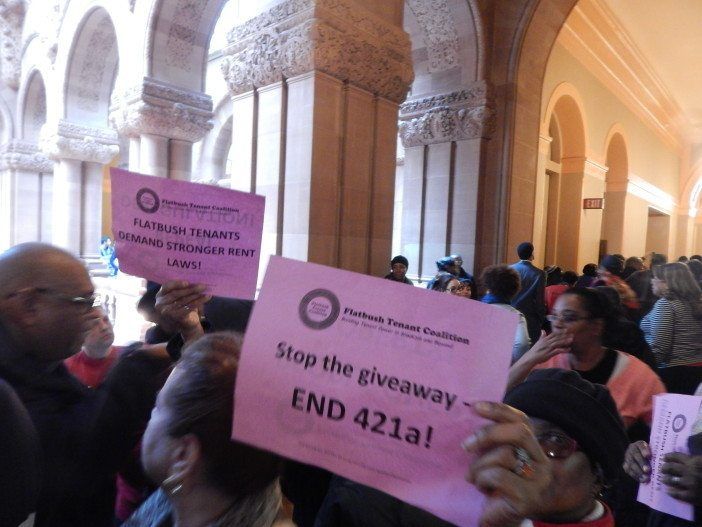Where Do Our Lawmakers Stand On The Controversial 421-a Property Tax Abatement Program For Developers?


This June, state lawmakers are expected to vote on renewing a 40-year-old tax exemption program, called 421-a, that tenant advocates and some local legislators have slammed as a complete debacle that has helped to line the pockets of large developers and pave the way for rapid gentrification.
There are varying opinions on what to do with 421-a, which will expire on June 15 – meaning lawmakers will have to vote on it in order for the program to continue – with tenant groups wanting it to be eliminated altogether and others, including some legislators, saying it should be reformed but not wiped out.
The 421-a tax abatement was set up in the 1970s recession to incentivize development at a time when residents were fleeing the city. As part of the program, developers are offered a tax abatement allowing them to pay real estate taxes on the assessed value of the land before construction for 10 to 25 years, depending on the project.
Today, developers of almost all residential developments of five units or more can receive the 421-a tax abatement in all but the wealthiest areas of New York City.
Critics have said 421-a has resulted in developers landing big tax breaks and not enough affordable housing being built. According to a new report from the Association for Neighborhood and Housing Development, the 421-a program in the fiscal year 2013 cost the city $1.1 billion in forgone tax revenue but resulted in only a little more than 13,000 affordable rental apartments.
Local State Senator Marty Golden has taken flak for being behind one of the most criticized applications of the 421-a program. Though midtown Manhattan has been excluded from 421-a since the area is already comprised of tony residential skyscrapers, a bill sponsored by Golden inexplicably waived the exemption for five luxury developments. The Daily News noted that the developers and their affiliates doled out $1.5 million in state-level campaign contributions.
Such questionable applications are fueling the charge to abolish the program altogether.
So, what do local lawmakers think of 421-a?
- Assemblyman Steven Cymbrowitz: Representing Sheepshead Bay and parts of Brighton Beach and Midwood, Cymbrowitz said “we will need to make significant changes to the 421-a program,” which he said “enriches developers and does not provide enough affordable housing.”
- Assemblyman Alec Brook-Krasny: The lawmaker, whose district covers such neighborhoods as Bay Ridge, Dyker Heights, and Fort Hamilton, told FTC members he would vote to end 421-a.
- Assemblyman William Colton: The Southern Brooklyn legislator, whose district includes Bensonhurst and Bath Beach, said he would eliminate 421-a. “Any time you amend it, the landlords find a way to get around it,” said Colton, who, prior to being elected, worked as a tenants’ rights lawyer.
- State Sen. Kevin Parker: The senator whose district covers such neighborhoods as Ditmas Park, Kensington, Park Slope, East Flatbush, and Flatlands, said he’d be in favor of reforming it, but not seeing it go by the wayside entirely. “You’ll never get rid of it,” Parker said. “There’s not the political will.”
- Assemblyman Jim Brennan: The lawmaker who covers such areas as Ditmas Park and Kensington said that while he’s in favor of reforming 421-a, it wouldn’t be possible to get rid of it because of the power of the real estate lobby.
- Assemblywoman Rodneyse Bichotte: The newly-elected Bichotte too said it borders on impossible to completely end 421-a but said the legislature could reform it.
- Assemblyman N. Nick Perry: Perry, whose district covers such areas as East Flatbush and Canarsie, said he wants to see 421-a end altogether.
- Assemblywoman Latrice Walker: Walker, whose district covers areas like Brownsville and Bushwick, also said she’s 100 percent for getting rid of 421-a.
The 421-a program was last renewed – with reforms – in 2011.
A more extensive version of this report can be found on our sister site, Ditmas Park Corner.
With additional reporting by Ned Berke and Rachel Silberstein.



